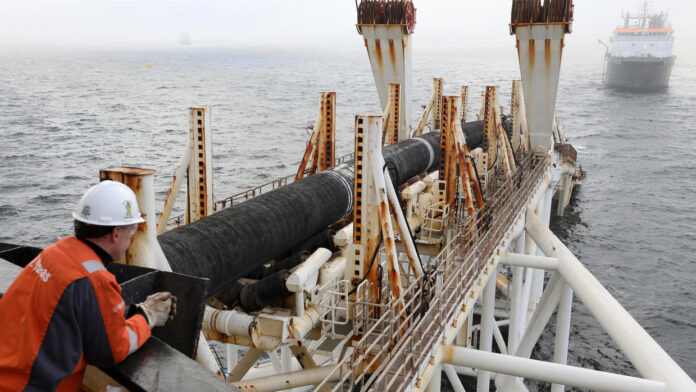BERLIN: Germany accused the US of interfering in its internal affairs on Saturday, in an increasingly angry spat over Washington’s decision to impose sanctions on companies involved with a major project to supply Western Europe with Russian gas.
Moscow and the European Union also issued statements criticising the sanctions, a day after President Donald Trump signed off on asset freezes and visa restrictions on those involved in the Nord Stream 2 project.
US lawmakers are seeking to stymie what they regard as an increasing reliance on Russian energy in Western Europe by targeting the project, which aims to double deliveries of Russian natural gas to Germany via a pipeline under the Baltic Sea.
In the first sign that the sanctions were beginning to bite, Swiss contractor Allseas suspended its Nord Stream 2 activities while it awaited clarification from the US authorities on the detail of the measures.
‘PARTICULARLY INCOMPREHENSIBLE’
Although US Congress overwhelmingly backed the sanctions, there was some criticism among lawmakers of a move that in effect punishes NATO allies such as Germany.
While an EU spokesman criticised “the imposition of sanctions against EU companies conducting legitimate business”, the German government said Berlin rejected “these sorts of extra-territorial sanctions”.
“They will hit German and European companies and constitute an interference in our internal affairs,” said Chancellor Angela Merkel’s spokeswoman Ulrike Demmer.
Russian Foreign Ministry spokeswoman Maria Zakharova accused the United States of pushing an ideology that hindered global trade, adding on her Facebook page: “Soon they will demand that we stop breathing.”
But the United States is not the only nation to question the project — Ukraine, Poland and some of the Baltic nations have also expressed doubts.
Ukraine had worried that the new pipeline would cut it out of the gas supply business and allow Russia to ratchet up pressure over other issues.
US lawmakers had cited support of Kiev as part of their justification for imposing sanctions.
But Demmer said this rationale was “particularly incomprehensible” because Moscow and Kiev reached an agreement in principle last week that will regulate the transit of Russian gas to Ukraine from 2020.
More than 80pc of the undersea pipeline has been completed for the project — half-financed by Russia’s state-owned Gazprom, with the other half paid for by five European companies.




